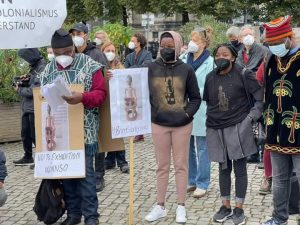The Minister or Arts and Culture, Pierre Ismael Bidoung Mkpatt has pledged to focus on the restoration of the creative art industry come 2022. The Minister made the remarks shortly after addressing the National Assembly, where he defended his ministry’s draft budget for the year 2022 to the tune of 5.6 Billion FCFA.
“The budget for 2022 which we just defended before the Finance Committee at the National Assembly will permit the different stakeholders of the ministry of Arts and Culture to continue working to fulfill the tasks assigned our ministry,” Minister Bidoung told journalists after the session.
Among these, he explained, is the development of some strategic objectives which include the development of the creative cultural industry and the livelihood of artists of all genres. This he said, is to curb the negative impacts of the COVID-19 pandemic many are still encountering today.
“The sub sector of arts and culture,” the minister stated, “has been the most negatively impacted by the COVID-19.”
Artists it should be noted, were among those most affected by the pandemic owing to among others, a lack of regular income streams throughout the period of the pandemic. Due to barrier measures imposed by government, very few events were held, leaving artists with little or no other outlets to earn.
“Artists had very difficult moments. Now we have hope…” said the Minister of Arts and Culture.
The proposed budget for next year, he went on, will thanks to the regulations in force governing the artistic sector, “… galvanise artists and motivate them to work in building resilience with dynamism, professionalism in the sub sector.”
The artistic sector is no stranger to problems. Prior to the COVID-19 pandemic which left artists stranded, the association binding artists across the country too had often been plagued by scandals and rumours of mismanagement. The structure had also been accused several times of failing to cater for the interest of its members. This was as artists often went for long periods without royalties, or allowances owed them.
Increased funding as solution
Addressing this challenging situation and others at the June session of parliament, it should be recalled, MPs said it was necessary to step up financing of the artistic and cultural domain. This increase, it stressed, should be done in light of ensuring the Ministry of Arts and Culture, MINAC’s budget is commensurate with the importance accorded to the sector in the national development strategy, NDS 2020-2030.
Chairing a sitting under the theme ‘the role of arts and culture in the development of Cameroon’, Deputy House Speaker, Hon Hilarion Etong, said the exchange was a demonstration of the state’s drive to make the most of the arts and culture sector.
He said: “It is good for the representatives of the nation to enhance the interest in the arts and culture sector to support the emergence of this sector and raise the interest of the private sector in the substantial improvement of the level of investments in its opportunities.”
This desire to see a positive increase, Hon Hilarion spelled out, is an evolution that “… should not only be theoretical but it should have an important budgetary impact”.
“The session is dedicated to this topic so that the necessary synergy between government and parliament should contribute to the effective implementation of adequate government policies that contribute to the emergence of our dear country.”
This, he added, should be “through the exploration and exploitation of all the potentialities including those relating to arts and culture.”
Culture as agent of unity
In the same light, Minister Bidung Mkpatt at the same plenary siting during the June session, opined that financing was essential to yield improvied results in his sector. With this, he said, it was essential to mobilise national private sector and international investors fund for the promotion of the cultural industry.
In addition to this, the minister further recommended restoring order in the authors’ rights corporation and reinforcing the judicial framework to better accommodate actors operating in the different domains of arts and culture.
“In today’s interconnected world, it is clear that culture has the power to transform society. The diverse manifestations that range from our precious historical monuments and museums, to traditional practices and contemporary art forms, enrich all aspects of our daily life in countless ways” Minister Bidoung told parliament.
Cameroon’s heritage, he furthered, “is a source of identity and cohesion for communities affected by the acceleration of change and economic instability. Creativity helps build open, inclusive and pluralistic societies. Both heritage and creativity help to found dynamic, innovative and prosperous knowledge societies”.
At the end of the session, parliament made a series of recommendations including the need to “speed up the creation of all the artistic and cultural federations and associations provided for and draw up standard bylaws for cultural and artistic federations and associations, [and] sign more bilateral and multilateral cooperation agreements and mainstream our culture in all aspects of development, cooperation and our diplomacy”.
The National Assembly also assigned Minister Bidoung Mkpatt to “improve cultural policies and practices in order to safeguard Cameroon’s tangible and intangible cultural heritage… Asserting Cameroon’s cultural identity as an offshoot of the country’s unity in diversity is critical for social cohesion.”
The further noted that “mainstreaming culture in government policy options, will not only enhance sustainable development, but will increase social, human and economic activities, and lay the groundwork for our country to become an emerging economy.”
With the Ministry of Arts and Culture seeking a 5.6 Billion FCFA budget to achieve these tasks and more come 2022, it is expected that most of the challenges would soon become a thing of the past.
(This article was first published in The Guardian Post newspaper)








